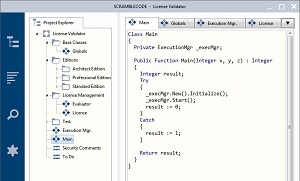News
Another New Programming Language, This One for Security
- By David Ramel
- February 10, 2017
Adding to the existing portfolio of some 700 programming languages is a new release candidate for Scramblecode, a security-oriented offering from Danish software vendor ProgramPartner ApS.
Scramblecode (presented as SCRAMBLECODE by the company) is all about encryption and safety.
"Scramblecode is an easy to learn programming language based on curly brackets and classes," the company says on its Web site. "It uses encrypted compilation to secure the code, and protects the execution while working with encrypted variables."
The company today announced release candidate 1 (RC1) for Scramblecode, which is available for download and testing that can be done completely off-line on a variety of machines.
The Scramblecode package comes with its own IDE, including a code editor, test bench and debugger. The company said that because Scramblecode implements memory encryption, ordinary debugging and memory analysis tools aren't effective.
 [Click on image for larger view.]
The Scramblecode IDE with a 'License Validator' Sample Project (source: ProgramPartner ApS)
[Click on image for larger view.]
The Scramblecode IDE with a 'License Validator' Sample Project (source: ProgramPartner ApS)
Built for Windows development, Scramblecode lets coders load a virtual machine (VM) into memory to execute private assembler instructions. ProgramPartner said it individually protects each instruction and works with encrypted variables in memory. Furthermore, an attack that cracks just one instruction (or even one bit) could crash program execution.
"Each development project can use a completely private set of instructions for the compiler," the company said. "In order to execute this private form of assembler, a [VM] is custom created and only this VM can understand and execute the compiled code."
In the face of new attack vectors emerging regularly, the company said Scramblecode is well suited for today's programming environment.
"The ability to make software resilient to malicious attacks is fast becoming increasingly important," ProgramPartner said in a statement. "Not only is the list of hacked computer systems getting longer all the time, but software is increasingly being deployed to environments controlled by other parties. As a consequence software containing valuable secrets should include a strong form of self-protection."
Security-conscious developers can further check out the pricing and documentation.
About the Author
David Ramel is an editor and writer at Converge 360.